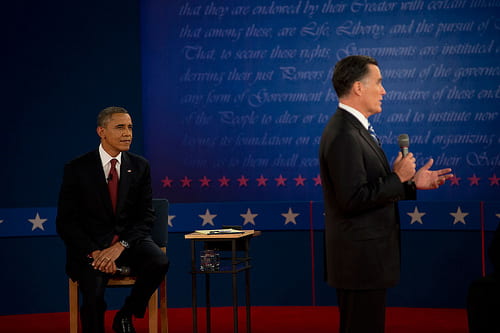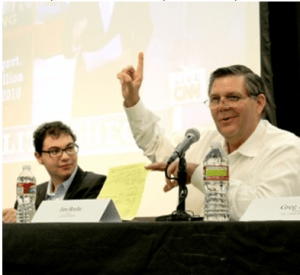
The Center on Communication Leadership & Policy, in partnership with Jesse M. Unruh Institute of Politics, welcomed members of the USC community to watch the second in a series of three live screenings of the presidential debates on campus.
Immediately following the debate, a bi-partisan panel analyzed the candidate’s performance.
The USC Political Student Assembly, USC College Democrats, and USC College Republicans helped to arrange the panel discussion, which featured the following participants:
- Jim Brulte, Former California State Senate and Assembly Republican Leader
- Garry South, a senior democratic strategist and former senior advisor to California Governor Gray Davis
- Max Schwartz, a member of the USC College Democrats
- Greg Sefain, a member of the USC College Republicans
Senior fellow Dan Schnur, Director of the Jesse M. Unruh Institute of Politics, served as moderator and began the post-debate discussion by asking the panelists to juxtapose the performance of each candidate in the first debate to their performance in the second debate.
 All four panelists agreed that Obama recovered from his lackluster performance in the first debate. Both Brulte and South noted that it is not uncommon for a president seeking a second term to struggle in the first presidential debate, to fall victim to the “curse of incumbency”, due to sheer lack of practice in the debate forum.
All four panelists agreed that Obama recovered from his lackluster performance in the first debate. Both Brulte and South noted that it is not uncommon for a president seeking a second term to struggle in the first presidential debate, to fall victim to the “curse of incumbency”, due to sheer lack of practice in the debate forum.
Like many of his predecessors, during the first debate Obama failed to meet high expectations, and fell short in the face of a determined Romney. Brulte noted, “I thought where in the first debate Mitt Romney had won, I thought it was relatively clear that Barack Obama won this debate.”
The panelists also discussed the candidate’s combative remarks regarding the attacks on Libya. Brulte highlighted this instance as one of the more contentious moments during the debate, citing the candidate’s invasion of each other’s personal space.
Additional topics addressed by the panelists included the candidates’ position on women’s issues, and undecided voters’ reaction to candidate remarks.
Specifically, which moments triggered large reactions – positive or negative – from undecided voters? For example, both Brulte and Schwartz commented on the overwhelmingly positive reaction of undecided voters to Romney’s emphasis on his faith in his closing remarks.
To close the panel, Schnur spoke about the implications of the town hall debate forum citing, “this is one of the rare occasions where you get to see the candidates unscripted, to see them under times of unanticipated questions and unanticipated circumstances.”
USC Annenberg Center on Communication Leadership & Policy and Jesse M. Unruh Institute of Politics will host a screening of the third presidential debate Monday, October 22nd from 5:30pm to 8:00pm in the USC Annenberg East Lobby. Immediately following the debate, a bi-partisan panel will provide expert analysis.